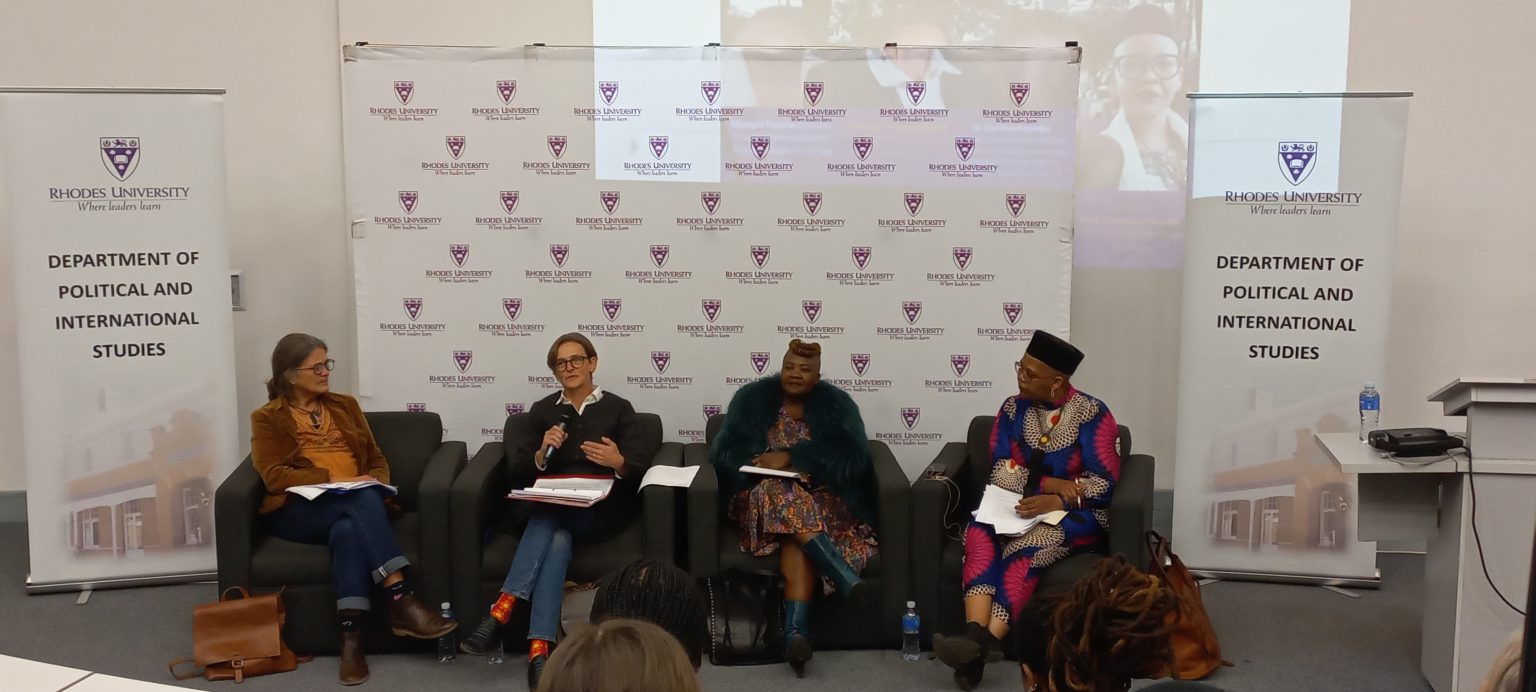By Aphiwe Ngowapi
Rhodes University’s Eden Grove was the site of a crucial and timely discussion on sexual harassment, gender-based violence and consent within South African universities on Thursday evening.
The talk, presented by the Office of Equity and Institutional Culture, the Political and International Studies Department and the Gender Action Forum, featured a panel presentation responding to the landmark case “S vs Coko” and a detailed report on ongoing issues of sexual violence in university settings.
The discussion was facilitated by Prof Siphokazi Magadla, the Political & International Studies head of department at Rhodes, with guests Sibongile Ndashe, the executive director of the Initiative for Strategic Litigation in Africa (ISLA), Advocate Bronwyn Pithey, advocate at Women’s Legal Centre and part of the legal team that argued the case in discussion, and Dr Corinne Knowles, a member of the Ministerial Task Team on Matters of Sexual Harassment and Gender Based Violence & Harm in South African Universities.
Photo: Aphiwe Ngowapi
The “S vs Coko” case, which involves a rape within an intimate relationship, served as a focal point for the discussion. The panel highlighted the complexities of consent, particularly in situations involving intimate partner violence. The survivor, who maintained a relationship with the perpetrator from mid June until 1 July, 2018, was clear in her refusal to engage in sexual penetration before and on the specific occasion, a boundary that was tragically violated. The panel commenced with Prof Magadla reading an account of the survivor, who is currently unnamed in this case, that detailed in her own words the experience of being violated by her then boyfriend’s denial of her bodily autonomy and her navigation of the South African justice system as a victim of rape.
The discussion also touched on the systemic failures in the judicial process, highlighting the unexpected nature of the “Coko” case’s prosecution.
A recent decision by the Supreme Court of Appeal (SCA) overturned a previous ruling that had acquitted Loyiso Coko of rape charges. In 2021, the Makhanda High Court, with acting judge Tembeka Ngcukaitobi, had set aside Coko’s conviction, finding him not guilty of raping his then girlfriend. However, in April 2024, the SCA reversed this decision, reinstating Coko’s conviction. The original case had sparked significant controversy, particularly around the issues of consent within intimate relationships. The SCA’s ruling has been seen as a critical move in reaffirming the importance of consent and addressing gender-based violence in South Africa.
Photo: Aphiwe Ngowapi
Advocate Pithey stated: “…linking it to the definition of rape and what consent means, is that consent is not a one-time thing. Consent is a continuous thing. It must be ascertained continuously and consistently, and there is an obligation to some extent on both parties to establish that consent in an ongoing way.”
The discussion underscored the necessity of ongoing dialogue about consent, not just in moments of crisis but as part of the educational fabric. Panelists called for comprehensive consent education beginning in high school, and stronger support systems within universities to ensure that survivors are heard and supported, rather than silenced.
The discussion was overwhelmingly attended by students and young people who engaged eagerly and attentively. Particular points were made about the university contexts of transition, and coming of age, and the power dynamics at play overtly and covertly in concealed interactions within higher education.
The report on sexual harassment and gender-based violence (GBV) in South African universities, released in May 2024, highlights the pervasive and alarming nature of these issues across higher education institutions. It is also revealing that sexual harassment and GBV remain widespread, with a significant number of incidents involving both students and staff. Many cases go unreported due to fear of retaliation or lack of trust in the institution’s handling of such cases.
The report criticises universities for inadequate responses to GBV, often prioritising their reputations over the well-being of victims. It notes that institutions frequently fail to provide sufficient support to survivors and rarely take meaningful action against perpetrators. A notable aspect of the task team was to identify major gaps in existing policies, such as the lack of effective reporting mechanisms and insufficient training for staff and students on issues of consent and GBV.
The report calls for comprehensive reforms, including the establishment of independent bodies to handle GBV cases, mandatory reporting, and, distinctly, the development of a national register of offenders to prevent perpetrators from moving between institutions without consequences.
This report underscores the urgent need for systemic change to protect students and staff from GBV and ensure accountability within South African universities. Panelists argued that universities must do more to address sexual violence, and noted a known case of an academic staff member having moved between major institutions of higher education, avoiding the completion of disciplinary procedures relating to GBV.
The talk concluded with a call to action for organised activism and solidarity, stressing that collective efforts are essential to creating a safer, more just academic environment.


